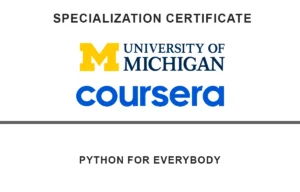The IBM AI Engineering Professional Certificate course offers a great opportunity to learn vital Artificial Intelligence skills that are increasingly important in today’s tech-driven world. This course teaches you how to create smart computer programs that can learn and make decisions, which can help solve complex problems. Gaining these skills not only opens doors to exciting job prospects but also empowers you to contribute to innovative AI solutions that can benefit various industries. We will provide you with a comprehensive review of this professional certificate offered by IBM through Coursera.
Table of Contents
Course Overview: IBM AI Engineering
Artificial intelligence (AI) is revolutionizing entire industries, changing the way companies across sectors leverage data to make decisions. To stay competitive, organizations need qualified AI engineers who use cutting-edge methods like machine learning algorithms and deep learning neural networks to provide data-driven actionable intelligence for their businesses. Through this intermediate-level program, you will master fundamental concepts of machine learning and deep learning, including supervised and unsupervised learning, using programming languages like Python. Throughout the program, you will build a portfolio of projects demonstrating your mastery of course topics. The hands-on projects will give you a practical working knowledge of Machine Learning libraries and Deep Learning frameworks such as SciPy, ScikitLearn, Keras, PyTorch, and TensorFlow. You will learn from subject-matter experts at IBM and after completing the full program, you’ll have a portfolio of projects and a Professional Certificate from IBM to showcase your expertise.
Course Content:
This 6-course Professional Certificate is designed to equip you with the tools you need to succeed in your career as an AI or ML engineer. Each course has modules based on different topics and each Module consider to be complete in one week.
Course 1: Machine Learning with Python
Dive into Machine Learning (ML) using Python! Whether you’re a Data Science pro or a newcomer, this course covers the essentials. Learn about supervised vs. unsupervised learning, regression, classification with K-Nearest Neighbors, decision trees, and clustering techniques. Hands-on experience with Python libraries like SciPy and scikit-learn is emphasized, including a final project showcasing your ML model-building skills. Gain job-ready skills and earn a machine learning certificate for your resume. The estimated course completion time is 12 hours.
Module 1: Introduction to Machine Learning
Module 2: Regression
Module 3: Classification
Module 4: Linear Classification
Module 5: Final Exam and Project
Course 2: Introduction to Deep Learning & Neural Networks with Keras
Start your Deep Learning journey with this course of IBM AI Engineering. Discover what deep learning is, how it compares to neural networks, and learn about various models. Build your first deep-learning model using the Keras library. After completion, you’ll grasp neural networks, deep learning models, and their differences, and understand unsupervised models like autoencoders, and supervised models like CNNs and recurrent networks. Create your deep-learning models using Keras. The estimated course completion time is 8 hours.
Module 1: Introduction to Neural Networks and Deep Learning
Module 2: Artificial Neural Networks
Module 3: Keras and Deep Learning Libraries
Module 4: Deep Learning Models
Module 5: Course Project
Course 3: Introduction to Computer Vision and Image Processing
Embark on the fascinating journey of Computer Vision in this beginner-friendly course. Explore its real-world applications like self-driving cars and augmented reality. Use Python, Pillow, and OpenCV for image processing, classification, and object detection. Hands-on labs and exercises will guide you through creating your image classifiers and detection models using CV Studio. No prior Machine Learning or Computer Vision experience is needed, just basic Python and math knowledge. By the end, you’ll build a computer vision web app and deploy it to the Cloud. The estimated course completion time is 21 hours.
Module 1: Introduction to Computer Vision
Module 2: Image Processing with OpenCV and Pillow
Module 3: Machine Learning Image Classification
Module 4: Neural Networks and Deep Learning for Image Classification
Module 5: Objection Detection
Module 6: Project Case: Not Quite a Self-Driving Car – Traffic Sign Classification
Course 4: Deep Neural Networks with PyTorch
Learn to create deep learning models with PyTorch in this comprehensive course of IBM AI Engineering. Begin with PyTorch’s tensors and Automatic differentiation, and progress through Linear and logistic regression, Feedforward deep neural networks, activation functions, normalization, dropout, Convolutional Neural Networks, and Transfer learning. Explore various other essential deep learning methods as well. The estimated course completion time is 30 hours.
Module 1: Tensor and Datasets
Module 2: Linear Regression
Module 3: Linear Regression PyTorch Way
Module 4: Multiple Input Output Linear Regression
Module 5: Logistic Regression for Classification
Module 6: Softmax Rergresstion
Module 7: Shallow Neural Networks
Module 8: Deep Networks
Module 9: Convolutional Neural Network
Module 10: Peer Review
Course 5: Building Deep Learning Models with TensorFlow
The majority of data in the world is unlabeled and unstructured. Shallow neural networks cannot easily capture relevant structure in, for instance, images, sound, and textual data. Deep networks are capable of discovering hidden structures within this type of data. In this course, you’ll use the TensorFlow library to apply deep learning to different data types to solve real-world problems. The estimated course completion time is 7 hours.
Module 1: Introduction
Module 2: Supervised Learning Models
Module 3: Supervised Learning Model (Cont’d)
Module 4: Unsupervised Deep Learning Models
Module 5: Unsupervised Deep Learning Models (Cont’d) and Scaling
Course 6: AI Capstone Project with Deep Learning
In this capstone, learners will apply their deep learning knowledge and expertise to a real-world challenge. They will use a library of their choice to develop and test a deep-learning model. They will load and pre-process data for a real problem, build the model, and validate it. Learners will then present a project report to demonstrate the validity of their model and their proficiency in the field of Deep Learning. The estimated course completion time is 15 hours.
Module 1: Data Loading
Module 2: 2 Quizzes
Module 3: 2 Quizzes
Module 4: Peer Review Assignment
Major Learnings:
- Describe machine learning, deep learning, neural networks, and ML algorithms like classification, regression, clustering, and dimensional reduction
- Implement supervised and unsupervised machine learning models using SciPy and ScikitLearn
- Deploy machine learning algorithms and pipelines on Apache Spark
- Build deep learning models and neural networks using Keras, PyTorch, and TensorFlow
Skills you will gain include Machine Learning, Deep Learning, Python Programming, machine learning, and deep learning libraries such as SciPy, ScikitLearn, Keras, PyTorch, and Tensorflow to industry problems involving object recognition, computer vision, image and video processing, text analytics, natural language processing (NLP), recommender systems, and other types of classifiers and more.
Applied Learning Projects:
Through hands-on projects, you’ll gain essential data science skills scaling machine learning algorithms on big data using Apache Spark. You’ll build, train, and deploy different types of deep architectures, including convolutional neural networks, recurrent networks, and autoencoders
Course Format and Duration:
This course is completely online, so there’s no need to attend a classroom in person. You can access your lectures, readings, and assignments anytime and anywhere via the web or mobile. You will learn through videos, assessments, and hands-on labs. You’ll work with various data sources and project scenarios to gain practical data manipulation experience and apply analytical skills. This program includes over 145 hours of instruction and hundreds of practice-based assessments. Ideally, it will take 2 months to complete if you spend 10 hours a week. Moreover, this course has a flexible schedule, meaning everyone can learn at their own pace.
Certificates and Credentials:
Finally, you will earn a job-ready certificate after all your hard work. This Professional Certificate has an ACE® recommendation. This program is ACE® approved—when you complete it. You can add these credentials to your LinkedIn profile, resume, or CV Share it on social media and in your performance review.
Pricing:
IBM Data Analyst Professional Certificate will cost you $ 49 per month. You can save money by increasing the course pace. If you complete the course in the recommended 2 months, it will cost you USD 98, and if you complete the course in 1 month, it will cost you $ 49 US. Enroll Now
Coursera also offers 7 days free trial with unlimited access to all courses in the Certificate. You can cancel the trial at any time with no penalties if you cancel before the trial ends if it’s not right for you.
Coursera Also offers financial aid in case you cannot bear the course fee. All you need to do is apply for financial aid and wait up to 16 days until your aid is approved.
Reviews from Other Users:
This professional certificate is rated 4.5 stars by 5,000+ learners, which shows this course adds great value to the course graduate career. Based on the survey, 75% of certificate graduates report positive outcomes.

Community and Networking Opportunities:
In addition to expert-led training and hands-on projects designed to prepare you for a job, you’ll get access to an interview practice tool, mock interviews, resume-building workshops, career coaching sessions, and more.
Conclusion and Recommendation:
After reviewing all course details, The IBM AI Engineering Professional Certificate provides a fantastic opportunity to learn crucial Artificial Intelligence skills in today’s tech-driven world. This course empowers you to create smart computer programs that can learn and make decisions, solving complex problems and opening doors to exciting job prospects. Not only that, but you’ll also contribute to innovative AI solutions benefiting various industries. With a comprehensive curriculum and hands-on projects, this certification equips you with valuable expertise for a thriving career in AI.
Comparison with Similar Courses:
If you are interested in specifically learning digital marketing & want to become Google certified data analyst, I will recommend you take a look at the Google data analyst professional course review offered on Coursera.





